Find answers to the most frequently asked questions about Palisade Applications, Prep & Installation, Performance and Environmental information.
Applications
The panels can be glued to smooth surfaces such as plaster, plasterboard or even to existing tiles. Other substrates in a dry environment that will work are drywall, plywood and OSB. In a wet environment, such as a tub or shower area, existing ceramic tile walls can be covered with no additional preparation required. Otherwise, installation over a waterproof substrate is required, such as Cement Board®, Schluter Kerdi Board®, GP Densheild®, Johns Manville Go Board®, Hardiebacker®, WPBK Triton®, Fiberock® and equivalent products. Always follow manufacturer’s installation instructions to create a waterproof enclosure. More information about installation methods are included on our installation guide.
Yes, seal all edges with DAP Kwik Seal Ultra sealant at the joint to prevent water infiltration. Apply a line of silicone sealant to the tongue and groove connection between the panels to ensure a completely waterproof joint. Also apply a line of silicone sealant between the panel and the edge of the shower or bath, and on inside corners. The sealant we recommend is DAP Kwik Seal Ultra. Be sure to read the sealant or adhesive instructions before use. Please see our Shower installation guide for more info.
Yes, but the panels are not intended to be painted. If desired, consult with your paint department for proper primer and paint for good adhesion.
No. We do not have matching paint available at this time.
Yes, as long as the substrate is in good condition.
No, Palisade is not exterior-grade-UV-stable.
No. The panels are designed to be used on a vertical wall surface.
Yes, they can be nailed through. You can also try a more temporary solution like command strips, which can be used to prevent any damage or holes in the Palisade panel
Yes, as long as the recommended installation methods and adhesives are used leaving 1/4 space at the edges to allow for expansion and contraction.
No.
No, we do not recommend installing Palisade panels on the ceiling.
Yes. As long as you seal all the connecting joints with a waterproof sealant you can use the Palisade panels to create a niche or shelf. We recommend installing any horizontal tile at very slight angle (under 10 degrees), so the water does not rest on the panel but slides off.
No. Adding and using trims is a personal choice and not required. See product installation guides for ways to finish an edge without trims.
We recommend using our new Palisade Trims.
Silicone sealant can also be used instead of trims. Inside corners can be caulked with a matching caulk or you can use clear silicone sealant.
Yes, we have developed trims with patterns to match the tile designs. However, due to the natural stone-like “veins” in some of the stone and granite tiles, the light/dark veining of the tiles will not always coordinate exactly with the trims.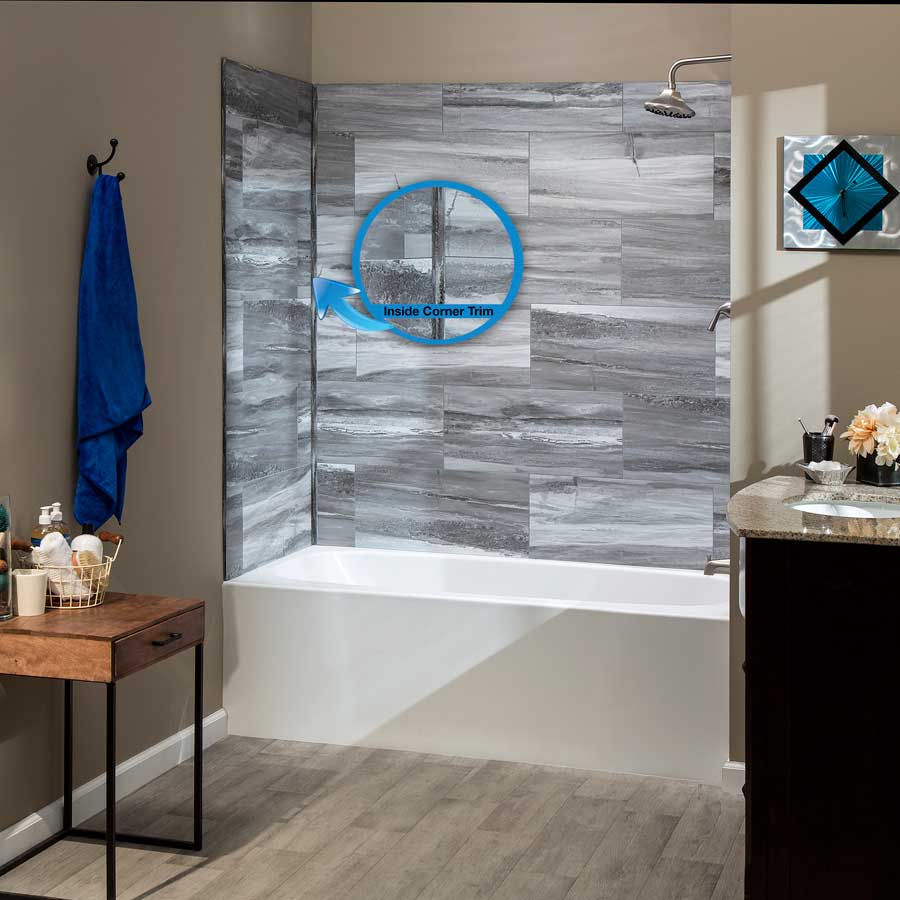

Prep & Installation
Yes. Please see our Shower Niche Installation Guide, here.
Yes. Palisade panels are easy to install by the average do-it-yourself consumer. The panels can be cut to size using a saw (manual or electric) or a utility knife.
It depends on the age and surface of your basement wall. In newer homes, the poured concrete walls are traditionally sealed from the outside. In older homes with concrete block foundations, you can seal with a concrete sealer like a Kilz. We do not recommend Palisade Panels be installed on raw concrete walls. See our installation guide, here.
If you choose to install Palisade on an existing wall, clean it with a good degreaser to make sure the wall is free from any contaminates that would affect adhesion.
This is not necessary. However, if you are using this in a wet environment such as shower enclosure, we do recommend sealing all edges with a silicone sealer.
For Shower Panel installs, plan for 2 tubes of silicone per shower. Each 5.5 oz tube will cover about 20 lineal feet of seams or trim joints. For Shower Tile installs, plan for 4 tubes of silicone per shower. Each 5.5 oz tube will cover about 20 lineal feet of seams or trim joints.
When gluing Palisade products on regular surfaces such as plasterboard or wood, we recommend using one of the following adhesives: Loctite® Power Grab® Ultimate (white formula only), Titebond® Titegrab Ultimate®, Liquid Nails® Fuze It® and Manus® 75-AM HV. For Canadian customers, we recommend Lepage No More Nails® Wet Instant Grab® adhesive. For Palisade to be used in wet environments, a bead of sealant must be used in each seam between panels. The sealant we recommend is SilTex® 40. For Canadian customers, we recommend Kwick Seal Plus®.
For a standard 10-oz tube of adhesive, cut the nozzle at the 1/4-inch bead mark and use a 1/4-inch bead. Each tube of adhesive covers approximately 16 sq ft. Add up the square footage of your project and divide that number by 16 to calculate how many tubes you’ll need.
The panels are not defective. During manufacturing, one corner of the overlap lip is intentionally milled off. This is to provide enough space for the four corners to fit together when four panels are connected. The milled tongue or groove does not impact the product performance or finished look.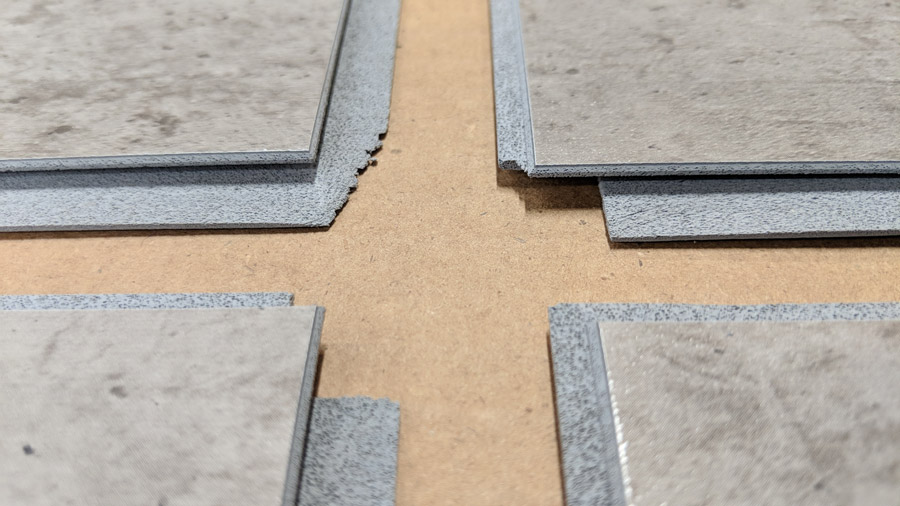
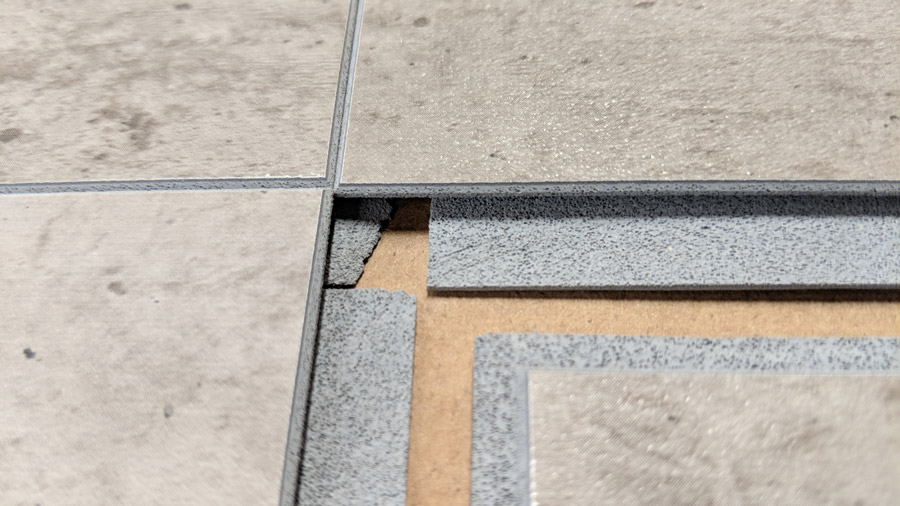
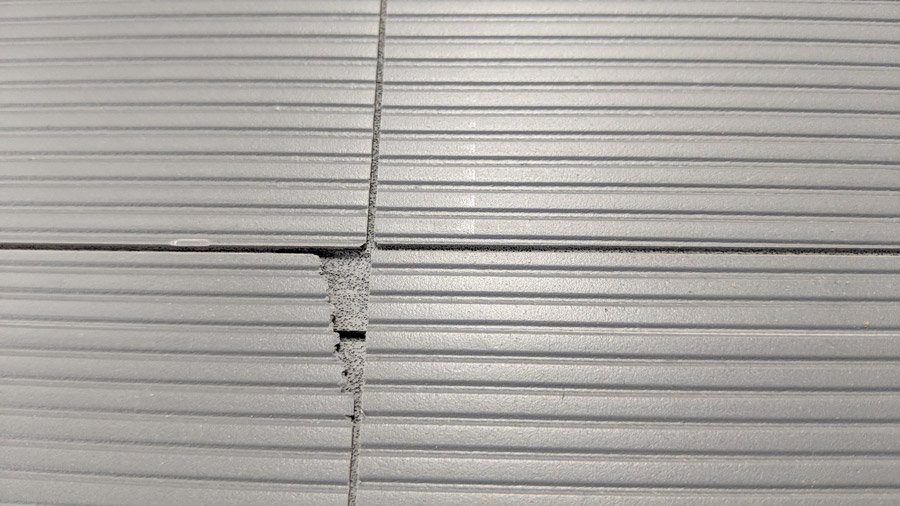
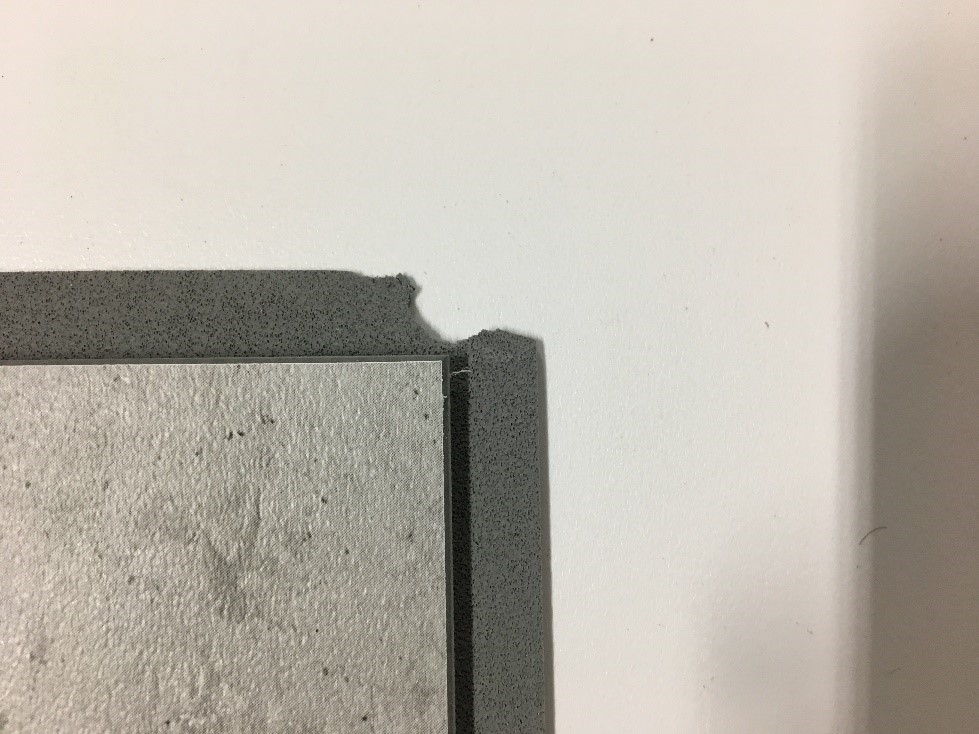




Not normally, however when installing in a wet room (such as a shower, for example), apply a line of silicone sealant to the tongue and groove connection between the panels to ensure a completely waterproof joint. Also apply a line of silicone sealant between the panel and the edge of the shower or bath, and on inside corners. The sealant we recommend is SilTex 40. For Canadian customers, Kwick Seal Plus. Be sure to read the sealant or adhesive instructions before use.
No. Grouting is not necessary as Palisade already has a manufactured grout line built in.
This can be accomplished and is treated like any other tongue and groove connection. Using a utility knife, cut the tongue of the panel you choose to remove. Once the tongue on both sides is removed, use a putty knife or paint scraper and slide the tool under the panel to be remove and apply outward pressure releasing the adhesive from the wall. You may need to repair the wall after removal if adhesive damages surface to prepare it for new panel.
You can trowel on the adhesive with a 1/4-inch notch trowel for more even coverage after applying adhesive to the back of the panel or trowel directly onto your wall.
Standard wood working tools like a table saw or circular saw with a fine tooth provide the best cut edge. Use a 60-tooth blade or higher. Alternatively, you can score one side a few times with a utility knife and snap the tile at the line. This method may require sanding the snapped edges. For larger-sized Shower System wall panels we recommend table saw or circular saw.
Palisade tiles can be applied to any of these types of systems. Follow the manufacturer’s recommending installation of the membrane system. Only our approved adhesives can be used to attach our tiles to the membrane. Do not use a thin-set mortar adhesive to apply the Palisade tiles to the membrane. Use only one of the following adhesives: Loctite® Power Grab® Ultimate (white formula only), Titebond® Titegrab Ultimate®, Liquid Nails® Fuze It® and Manus® 75-AM HV. For Canadian customers, we recommend Lepage No More Nails® Wet Instant Grab® adhesive.
Yes, you can use a waterproofing membrane like HydraFlex® or AquaDefense® applied to the recommended substrates in our installation guide. Follow waterproofing membrane manufacturer’s instructions.
If some of the adhesive has dried on the finish side of the panels, you can use mineral spirits to remove it. This is the only solvent that can be used that will not damage the finish on the tile. It is best to remove any excess adhesive immediately using a damp cloth. Allowing excess adhesive to dry on the finished side of the panel may harm the finish.
Here is a guide to help you build a custom Niche for your shower wall project.
No, the tiles are directional and can only be connected one way by locking the tongue and groove edges together. When oriented correctly, the groove edges are on the top and left-hand side of the panel. The tongue will be on the bottom and right-hand side of the panels. See image below for details.
Occasionally a bench will arrive slightly warped open. This can occur in shipping or due to excess heat. To mitigate the problem simply install bench as directed in the install guide and hold with a clamp until the glue sets. This solution also works the same with a similar issue with the shelf.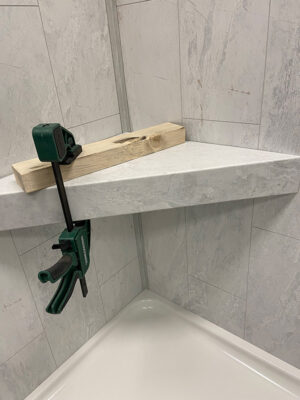
The panels included in the Palisade shower wall system are designed to be installed in a standard 60-inch wide shower system. As such, each panel measures nominally smaller than the stated size to allow for ease of handling when fitting the tongue and groove feature, and to accommodate the corner trims.
Performance
Excellent. The panels are 100% waterproof.
Palisade tiles can withstand heat up to 140-degrees F without causing any damage to the product. We recommend a minimum 6-inch space between the heat source or burner and the installed tiles. You may also refer to your stove’s (or other heat source) manufacturer for specific information.
Our panels can withstand a maximum continuous temperature of 140°F. This means that Palisade PVC panels can be used as a shower wall panel, but cannot be used in saunas or steam rooms. Palisade should be installed in temperatures between 40°F and 110°F (4 °C and 43°C).
The panels can be cleaned using any typical household, non-abrasive cleaning agent. Normally, you only need a damp cloth to clean the panels thoroughly. Do not use abrasive substances or cleaning products based on chloride. We do not recommend using solvents. Adhesive residue or pen marks are best removed using isopropyl alcohol. Cleaning products that have been tested with Palisade tiles and have proven to be effective and non-damaging are: Scrubbing Bubbles©, Tilex©, Kaboom©, CLR©, Iron Out© and Goo Gone©.
Yes, there is a durable, UV-cured, protective polyurethane layer on the surface of the panels. This wear-and-scratch-resistant layer will prevent moderate abuse. The tiles are intended as a wall product, however, and can be scratched by sharp objects or dented by blunt force. Palisade tiles have better wear and scratch resistance than most wall treatments, such as painted drywall or paneling. Panels should be cleaned with household or mild commercial cleaners that do not contain abrasives.
Palisade PVC panels have the following fire classification rate: US STANDARD ASTM E84: Flame spread (FSI) 40, Class B.
Palisade panels are guaranteed for a period of 10 years.
Yes. The decorative, photo-realistic pattern repeats about every eight tiles. The location on each tile where the pattern repeats is always different, however, resulting in a unique look for each tile.
We have tested using lacquer thinner to remove spray paint and permanent marker from the panels with success. The solvent does not affect the protective coating on the panels and will remove most graffiti and serious staining. After stain removal, use a warm water and soap solution to rinse off the solvent.
Environmental
No. Our products are not harmful to your health. All our products are classified as A+ (very low emission of pollutants), which is the best rating for indoor wall cladding. This means you can use our products in your house with no harmful effect on health.
Yes. Palisade panels can be recycled and be taken to any plastic recycling facility.
You may see a warning on this product regarding California’s Proposition 65, the Safe Drinking Water and Toxic Enforcement Act of 1986. It is intended to help Californians make informed decisions about protecting themselves from chemicals known to cause cancer, birth defects or other reproductive harm. The Proposition requires the state to maintain and update a list of chemicals known to the state to cause cancer or reproductive toxicity.
Proposition 65 is designed to inform consumers. This is not the same as a regulatory decision that a product is “safe” or “unsafe”. Our products emit no volatile organic compounds (VOC’s) and are in no way harmful if the product is used for its intended purpose. At Acoustic Ceiling Products, customer satisfaction is our number one priority and we will be happy to provide any additional information, technical specs or data you may need on any of our products.


